WHEELS of INDUSTRY
Page 38
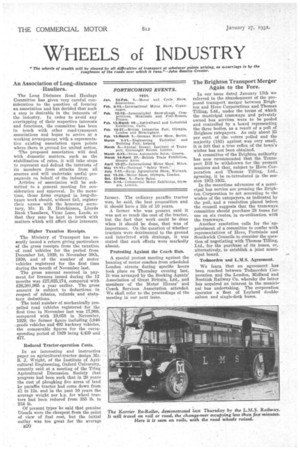
Page 39
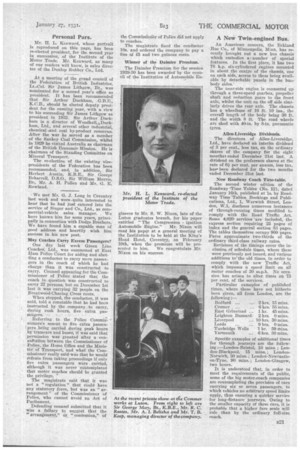
Page 40
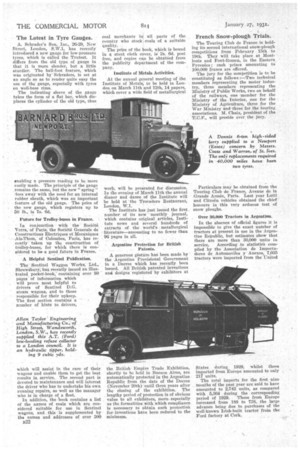
Page 41
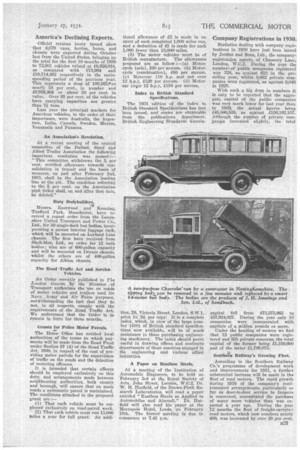
Page 42
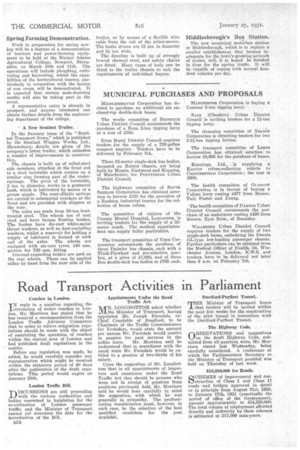
If you've noticed an error in this article please click here to report it so we can fix it.
"The wheels of wealth will be slowed by all difficulties of transport at whatever points arising, as ascarriage is by the roughness of the roads over which it runs."—John Beattie Crozier, An Association of Long-distance Hauliers.
The Long Distance Road Haulage Committee has given -very careful considerationto the question of forming an association and has decided that such a step is desirable in the interests of the industry. in order to avoid any overlapping of their respective interests and functions, the Committee has been in touch with other road-transport associations and hopes to arrive at a working arrangement with a representative existing association upon points where there is ground for united action.
'The proposed association will deal with domestic matters, such as the stabilization of rates, it will take steps to represent and defend the interests of its members from attacks from all sources and will undertake useful propaganda on behalf of the industry.
Articles of association will be submitted• to a general meeting for consideration and approval. In the meantime, those firms engaged in long-distance work should, without fail, register their names with the honorary secretary, Mr. E. B. Hutchinson, Lloyds Bank Chambers, Vicar Lane, Leeds, so that they may be kept in touch with matters which will affect their interests.
Higher Taxation Receipts.
The Ministry of Transport has regently issued a return giving particulars of the gross receipts from the taxation of road v.ehicles for the period from December 1st, 1929, to November 30th, 1930, and of the number of motor vehicles registered for the first time during the month of November last, The gross amount received in payment for licences issued during the 12 months was £27,825,174, compared with £26,301,965 a year earlier. The gross amount is subject to deductions in respect of rebates, refunds and statu-.
tory deductions. • The total number of mechanically propelled road vehicles registered for the first time in November last was 17,908, compared with 19,058 in November, 1929, the former figure including 3,946 goods vehicles and 492 hackney vehicles, the comparable figures forthe corresponding period of 1929 being 4,439 and 477.
• Reduced Tractor-operation Costs.
In an interesting and instructive paper on agricultural-tractor design Mr. S. J. Wright, of the Institute of Agricultural Engineering, Oxford University, recently said at a meeting of the Tfing Agricultural Discussion Society that progress had been such that in 20 years the cost of ploughing five acres of land by paraffin tractor had come down from £1 to 12s. and in the past 10 years the average weight per h.p. for wheel tractors had been reduced from 355 lb. to 234 lb. , Of present types he said that genuine Diesels were the cheapest from the point of view of fuel cost, but the initial outlay was too great for the average B20 farmer. The ordinary paraffin tractor was, he said, the best proposition and it should have a life of 10 years.
A farmer who was present said it was not so much the cost of the tractor, but the fact that work could be done when it should be done, that was of importance. On the question of whether tractors were detrimental to the ground and interfered with drainage, it was stated that such effects were markedly absent.
Protesting Against the Coach Ban.
A special protest meeting against the banning of motor coaches from scheduled London streets during specific hours took place on Thursday evening last. It was arranged by the Booking Agents' Association of Great Britain, Ltd., and membersof the Motor Hirers' and Coach Serv.ices Association attended. We shall refer to the proceedings of the meeting in our next issue. The Brighton Transport Merger Again to the Fore.
In our issue dated January 13th we referred to the abandonment of the proPosed transport merger between Brighton and Hove Corporations and Thomas Tilling, Ltd., under the terms of which the municipal tramways and privately owned bus services were to be pooled and controlled by a board representing the three bodies, as a result of a poll of Brighton ratepayers. As only about 23 -per cent, of the voters polled and the majority (183) against was very small, it is felt that a true reflex -of the town's wishes has not been obtained.
A committee of the Brighton authority has now recommended that the Transport Bill be withdrawn for the present sessions and that, subject to Hove Corporation -and Thomas Tilling, Ltd., agreeing, it be re-introduced in the session 1931-1932.
In the' meantime advocates of a municipal bas service are pressing the Brighton Corporation to act according to the wishes of the ratepayers, as indicated by the poll, and a resolution placed before the council suggests that the tramways committee should purchase 28 buses for use on six routes, in co-ordination with the tramways. • Another resolution calls for the 'appointment of a committee to confer with representatives of Hove, Portslade and Southwick Councils to consider the question of negotiating with Thomas Tilling, Ltd., for the purchase of its buses, or, alternatively, to establish a joint municipal board.
Todmorden and L.M.S. Agreement.
We learn that an agreement has been reached between Tochnorden Corporation and the London, Midland and Scottish Railway Co. whereby the latter has acquired an interest in the municipal bus undertaking. The corporation operates a fleet of Leyland doublesaloon and single-deck buses.
Personal Pars.
Mr. H. L. Kenward, whose portrait is reproduced on this page, has been re-elected president, for the second year in succession, of the Institute of the Motor Trade. Mr. Kenward, as many of our readers will know, is sales director of the Dunlop Rubber Co., Ltd.
At a meeting of the grand council of the Federation of British Industries, Lt.-Col. Sir James Lithgow, Et., was nominated for a second year's office as president. It has been recommended that Sir Arthur Duckharo, G.B.E„ K.C.B., should be elected deputy president for the ensuing year, with a view to his succeeding Sir James Lithgow as president in 1932. Sir Arthur Duckham is a director of Woodhall,kDuckham, Ltd., and several other industrial, chemical .and coal by-product concerns. After the war he served as a member of the Sankey Coal Commission, whilst in 1929 he visited Australia as chairman of the British Economic Mission. He is chairman of the Standing Committee on Mineral Transport.
The re-election of the existing vicepresidents of the Federation has been recommended, and, in addition, Sir Herbert . Austin, K.B.E., Sir George Beharrell, D.S.O., Sir William Morris, Bt., Mr, A. H. Pollen and Mr. G. E. Rowland.
We met Mr. G. J. Long in Coventry last week and were,quite interested to hear that he had just entered into the service of Singer and Co., Ltd., as commercial-vehicle sales manager. , We have known him for some years, principally in connection with Dodge Brothers. We have found him a capable man of good address and heartily wish him success in his new post.
May Coaches Carry Excess Passengers?
One day last week Green Line Coaches', Ltd., was summoned at East Ham Police Court for aiding and abetting a conductor to carry more passengers in the coach of which he had charge than it was constructed to carry. Counsel appearing for the Commissioner of Police stated that the coach in question was constructed to carry 27 persons, hut on December 1st last it was carrying 32 people on the Brentwood-Charing .Cross route. , When stopped, the conductor, it was said, told a constable that he had been instructed by the company. to carry, during rush hours, five extra Pas sengers. •
Referring to the Police Commis• sionors's assent to five extra passengers..beihg carried during peak hours by tramcars and buseS; it was said that permission was granted after a consultation between the Commissioner of Police, the Home Office and the Minister. Of Transport, and what the Commissioner really said was that he would refrain from taking proceedings if only five extra passengers were carried, although it was never 'contemplated that motor coaches should be granted the privilege. 7
The. magistrate said that it was not a " regulation " that could have any statutory force, but was an " arrangement " of the Commissioner of Police, who cannot avoid an Act of Parliament.
,Defending counsel submitted that it Was a .fallacy to suggest that the "-arrangement," 'Ur " conCesaion," Of
the Commissioner of Police did not apply to coaches.
The magistrate fined the conductor 10s. and ordered the company to pay a fine of £5 and two guineas costs.
Winner of the Daimler Premium, The Daimler Premium for the session 1929-30 has been awarded by the council of the Institution of Automobile En gineers to Mr. S. W. Nixon, late of the Luton graduates branch, for his paper entitled "The Compression ignition Automobile Engine." Mr. Nixon will read his paper at a general meeting of the Institution to be held at the Ki'ng's Head Hotel, Coventry, on February 10th, when the premium will be pre sented to him, We congratulate Mr. Nixon on his success.
A New Twin-engined Bus.
An American concern, the Eckland -Bus Co.' of Minneapolis, Minn, has recently brought out a new bus chassis which embodies a ,.number of special features. • In the first place, it has two 78 h.p. six-cylindered engines mounted in about the centre of the chassis, one on each side, access to them being available by detachable panels in the busbody sides." The near-side engine is connected up through a three-speed gearbox, propeller shaft and reduction gears to the front axle, whilst the unit on the off side similarly drives the rear axle. The chassis has a wheelbase of 16 ft. 10 ins.' the overall length of the body being 30 ft. and the width 8 ft. The road wheels are shod with 40-in. by 8-in, pneumatic tyres.
Allen-Liversidge Dividends.
The directors of Allen-Liversidge. Ltd., have declared an interim dividend of 3 per cent., less tax, on the ordinary shares of the company for the eight monthsi ended December 31st last. A dividend on the preference shares at the rate of 6,-k per cent. per annum, less tax, hash been declared for the two months ended December 31st last.
New Roadway Coach Time-table.
The second winter edition of the Roadway 'Time Tables (No. 12), dated January 16th, published at is. by Roadway Time 'Tables, Bookings and Publications, Ltd., 1, Warwick Street, London, W.1, discloses numerous instances of through-running times modified to comply with the Read Traffic Act. Some 4,020' services are included, the express section requiring 25 pages of index and the ge..neral section 83 pages. The tables themselves occupy 900 pages. Fares approximate two-thirds of the ordinary third-class railway rates.
Revisions of the timings cover the inclusion of schedule times, where these were previously not issued, and various additions to' the old times, in order to comply with the new Traffic Act, which imposes a speed limit on all motor coaches of 30 m.p.h. No occasion has arisen to alter times on 75 per cent. of the services.
Particular examples of published times, where these have not hitherto been given, all from London, are the following:—
Bedford ... 2 hrs. 15 mins.
Cromer ... ... 6 hrs. 55 mins.
East Grinstead ... 1 hr. 45 mins.
Leighton Buzzard 2 hrs. 0 mins.
Liverpool ... 10 hrs. 30 mins.
Leeds ... ... 9 hrs. 0 mins.
Tunbridge Wells 1 hr. 59 mins.
Yarmouth ... 6 hrs. 30 mins.
Specific examples of additional times for through journeys are the following :—London-Bristol, 10 mins.; London-Blackpool, 15 thins.; LondonNorwich, 30 mins. ; London-Newcastleon-Tyne, 90 mins.; London-Glasgow, two hours.
It is understood that, in order to meet the requirements of the public, some of the big motor-coach companies are contemplating the provision of cars carrying six or seven passengers, to which vehicles no arbitrary speed limits apply, thus ensuring a quicker service
• for long-distance journeys. Owing to the smaller capacity of these ears, it is • probable that a higher fare scale will rule than by the ordinary full-size coach.
The Latest in Tyre Gauges.
A. Schrader's Son, Inc., 20-29, New Street, London, S.W.1, has recently introduced a new gauge for low-pressure tyres, which is called the Trutest. It differs from the old type of gauge in that it is more slender, but a little sturdier. The ball-foot feature, which was originated by Schraders, is set at an angle so as to render quite easy the use of the gauge, especially with tyres on well-base rims.
The indicating sleeve of the gauge takes the form of a fiat bar, which displaces the cylinder of the old type, thus • enabling a pressure reading to be more easily made. The principle of the gauge remains the same, but the new " spring" does 'away with the need for an internal rubber sheath, which was an important feature of the old gauge. The price of • the new gauge, which registers up to
• 50 lb., is 7s. Oil.
Future for Trolley-buses in France.
• In conjunction with the Societe Vetra, of Paris, the Societe Generale de Constructions Electriques et Mecaniques Als-Thom, of Colombes, Paris, has recently taken up the construction of• trolley-buses, for which there is considered to bea gobd future in France.
A Helpful Sentinel Publication.
....Sentinel Waggon Works, Ltd., ShrewSbury, has recently issued an illustrated pocket-book, containing over 80 pnges of information which will prove most helpful to drivers of Sentinel D.G. steam wagons, and to those responsible for their upkeep.
The first section contains" a number of hints to drivers,
which will assist in the care of their wagons and enable them to get the best results in service. The second part is devoted to maintenance and will interest the driver who has to undertake his own running repairs, as well as the manager who is in charge of a fleet.
In addition, the /book contains a list of the names of coals which are considered suitable for use in Sentinel wagons, and this is supplemented by the names and addresses of over 300
B22 coal merchants in all parts of the country who stock coals of a suitable quality.
The price of the book, which is bound in a stout cloth cover, is 2s. 6d. post free, and copies can be obtained from the publicity department of the company.
Institute of Metals Activities.
At the annual general meeting of the Institute of Metals, to be held in London on March 11th and 12th, 14 papers, which cover a wide field of metallurgical work, will be presented for discussion. In the evening of March 11th the annual dinner and dance of the Institute will be held at ' the Trocadero Restaurant, London, W.1.
The Institute has just issued the first number of its new monthly journal, which contains original articles, Institute news and several hundreds of extracts • of the world's -.metallurgical literature—amounting to no fewer than 96 pages in all.
Argentine Protection for British Patents.
A generous gesture has been made by. the Argentine Provisional Government in a Decree which has recently been issued. All British patented inventions and designs registered by exhibitors at the British Empire Trade Exhibition, shortly to be held in Buenos Aires, are automatically protected in the Argentine Republic from the date of the Decree (November 20th) until three years after the closing of the exhibition. The lengthy period of protection is of obvious value to all exhibitors, more especially as the formalities with which compliance is necessary to obtain such protection for inventions have been reduced to the minimum. French Snow-plough Trials.
The Touring Club de France is holding its second international snow-plough competitions from February 15th to 19th. They will take place at Montlouis and Font-Romen, in the Eastern Pyrenees; cash prizes amounting to 100,000 francs are offered. The jury for the competition is to be constituted as follows :—Two technical members representing the motor industry, three members representing the Ministry of Public Works, two on behalf of the railways, one member for the Ministry of the Interior, one for the Ministry of Agriculture, three for the War Ministry and-three for the touring associations. M. Chaix, president of the T.C.F., will preside over the jury.
Particulars may be obtained from the Touring Club de France, Avenue de In Grande Arraee, Paris. Last year Latil and Citroen vehicles obtained the chief honours in this very arduous test of snow ploughs.
Over 30,000 Tractors in Argentina.
In the absence of official figures it is impossible to give the exact number of tractors at present in use in the Argentine Republic, but estimates show that there are more than 30,000 units in service. According to statistics compiled by the Association de Importadores de Automoviles y Anexos, 7,035 tractors were imported from the United States durino.' 1929, whilst those imported from Europe amounted to only 217 units.
The total imports for the first nine months of the past year are said to have amounted to 2,742 units, as compared with 5,304 during the corresponding period of 1929. Those from Europe increased from 188 to 738, the large advance being due to purchases of the well-known Irish-built tractor from the Ford factory at Cork.
America's Declining Exports.
Official returns lately issued show 'that 4,079 vans, lorries, buses, and chassis were exported during October last from the United States, bringing up the total for the first 10 months of 1920 to 73,801 vebicles valued at £9,856,018, as compared with 173,964 and .119,714,482 respectively in the corresponding period of the previous year. This represents a drop of 100,1637or nearly 58 per cent., in number and 19858,464 or -about 50 per cent. in value. Over 95 per cent, of the vehicles have carrying capacities not greater than 2i. tons.
Last year the principal markets for American vehicles, in the order of their importance, were Australia, the Argentine, India, Canada, Sweden, Mexico, Venezuela and Panama.
An Association's Resolution.
At a recent meeting of the central committee of the Ballast, Sand and Allied Trades Association the following -important resolution was passed This committee withdraws the 5 per "cent certified ,allowance towards consolidation in transit and the basis of measure, on and after February 2nd, 1931, shall be the Association loading line at the pit. The condition referring to the 5 per cent, on the Association pink ticket shall, on and after that date, be deleted."
Busy Bodybuilders.
Messrs. Eastwood and Kenning, Trafford Park, Manchester, have received a repeat order from the Lancashire United Transport and Power Co., Ltd., for 10 single-deck bus bodies, incorporating a patent interior luggage rack, which will be mounted on Leyland Lion chassis. The firm have received from Shell-Mex, Ltd., an order for 12 tank bodies ; nine are of 600-gallon capacity and will be mounted on Dennis chassis, whilst the others are of 400-gallon capacity for Albion chassis.
The Road •Traffic Act and Service Vehicles.
An Order recently published in The Landon Gazette by the Minister of Transport authorizes the 'uSe on roads of motor vehicles and trailers used for Navy, Army. and Air Force purposes, . notwithstanding the fact that they do not, in all respects, comply with the requirements of the Rodad Traffic Act. .We understand that the Order is to remain in force for three months.
Grants for Pollee Motor Patrols.
The Home Office has notified local authorities of the terms on which payments will be made from the Road Fund under Section 57 (4) .of the Road Traffic Act, 1930, in respect of the cost of providing motor patrols for the supervision of traffic on the roads and the detection of motoring offences.
It is intended that certain officers should be employed exclusively on this duty, and arrangements made between neighbouring authorities, both county and borough, will ensure that on main roads a systematic patrol is maintained. The conditions attached to the proposed grant are (1) That each vehicle must be employed exclusively on road-patrol work. ' (2) That each vehicle must run 13,000 miles a year for full grant An addi tional allowance of £2 is made in respect of each completed 1,000 miles run, • and a deduction of 15 is made for each 1,000 fewer than 13,000-miles.
• (3) The motor vehicles must be of British manufacture. The allowances proposed are as follow :.—(a) Motorcycle (solo), £60 per annum. (b) Motorcycle (combination), £80 per annum. (c) Motorcar (10 13.p. and not over 12 h.p.), £120 per annum. (d) Motorcar •(coer 12 h.p.), 1150 per annum.
Index to British Standard Specifications.
The 1931 edition of the index to British Standard Specifications has just been issued, and copies 'are obtainable from the publications department, British Engineering Standards Issocia
tion, 28, Victoria Street, London, S.W.1, price is,' 2d. per copy: It is a complete iudei, -which, in view of the large number (410) of British standard specifications now available, will be of much assistance to those purchasing engineering machinery. The index should prove useful in 'drawing offices and contracts departments of those concerns engaged in the engineering and various allied industries.
A Paper on Rustless Steels.
At a meeting of the Institution of Automobile Engineers, to be held on February 3rd at the Royal Society of Arts, John Street, London, W.C.2, Dr. W. H. Hatfield, of the Brown-Firth Research Laboratories, will read a paper entitled " Rustless Steels as Applied to Automobiles and Aircraft." Dr. Hat'field wilt also read his paper at the Metropole Hotel, Leeds, on February 18th. The former meeting is due to commence at 7.45 p.m.
Company Registrations in 1939.
Statistics dealing with company registrations in 1930 have just been issued by Jordan and Sons, Ltd., the companyregistration agents, of Chancery Lane, London, W.C.2. During the year the 33.umber4 of. public companies registered was 328, as against 623 in the preceding year, whilst 8,082 private com paniesregistered, as against 8,049 in 192.
With such a big drop in numbers it is only to be expected that the aggregate capital of the public companies was very much lower for last year than in 1929, the actual figures being £45,800,535, as against. £156,192,157. Although the number of private_ eorapanies increased slightly, the' total capital fell from £73,375,965 to £57,924,827. During the year only 10 companies were incorporated with capitals of a million pounds or more.
Under the heading of motors we find that 12 public companies were registered and 555 private concerns, the total capital of the former being 11,159,600 and of the latter 11,709,075.
"
Souther.1an Railway's Growing Fleet.
According to the Southern Railway Co.'s programme of development work and improvements for 1931, a further substantial increase will be made in tha fleet of rand motors. The rapid growth during 1930 of the company's roadtransport arrangements, particularly so far as door-to-door service to farmers is concerned, necessitated the purchasa of many more vehicles than was expected a year ago. During the past 12 months the fleet of freight-carryinl 'road motors, which now numbers nearly 400, was increased by over 20 per cent.
Spring Farming Demonstration.
Work in preparation for spring sowing will be a feature of a demonstration of tractors and power-fartniug equipment to be held at the Harper Adams Agricultural College, Newport, Shropshire, on March 10th and 11th. The operations will include ploughing, cultivating and harrowing, whilst the capabilities of the horticultural tractor, particularly in connection with the hoeing of row crops, will be demonstrated. It is expected that certain mole-draining outfits will also be taking part in the event.
A representative entry is already in prospect, and anyone interested can obtain further details from the engineering department of the college.
A New Sentinel Trailer. , In the January issue of the "Sentinel Transport News," which is published by the Sentinel Waggon Works, Ltd., Shrewsbury; details are given of the company's latest trailer, which embodiae a number of improvements in construction.
The chassis is built up of rolled-steel side members, attached at the front end to a steel turntable which rotates on a similar ring forming part of the undercarriage. The pivot of the turntable, 2 ins, in diameter, works in a guninetal bush, which is lubricated by means of a grease nipple. The semi-elliptic springs are carried in substantial brackets at the front and are provided with slippers at the rear.
The axles are made from 50-ton heattreated steel. The wheels are of cast steel and have bronze floating bushes. The bushes have die-cast white-metal thrust washers, as well as dust-excluding washers, whilst a reservoir for holding a supply of lubricant is formed at each end of the axles. The wheels are equipped with air-core tyres, 140 ram. section for '720 mm. fitting.
Internal-expanding brakes are used on the rear wheels. These can he applied either by hand from the near side of the trailer, or by means of a--flexible wire cable from the cab of the prime-mover. The brake drums are 15 ins, in diameter and 2i ins. wide.
The drawbar is built up of strongly braced channel steel, and safety chains are fitted. Many types of body can be fitted to the trailer chassis to suit the requirements of individual buyers.
Siddiesbrough's Bus Station.
. The new municipal motorbus stationat Middlesbrough, which is to replaCe-et smaller establishment that became inadequate for the town's growing network of routes, will, it is hoped be finished in time for the spring traffic. It will be capable of coping with several 'hundred vehicles per day.




































































































